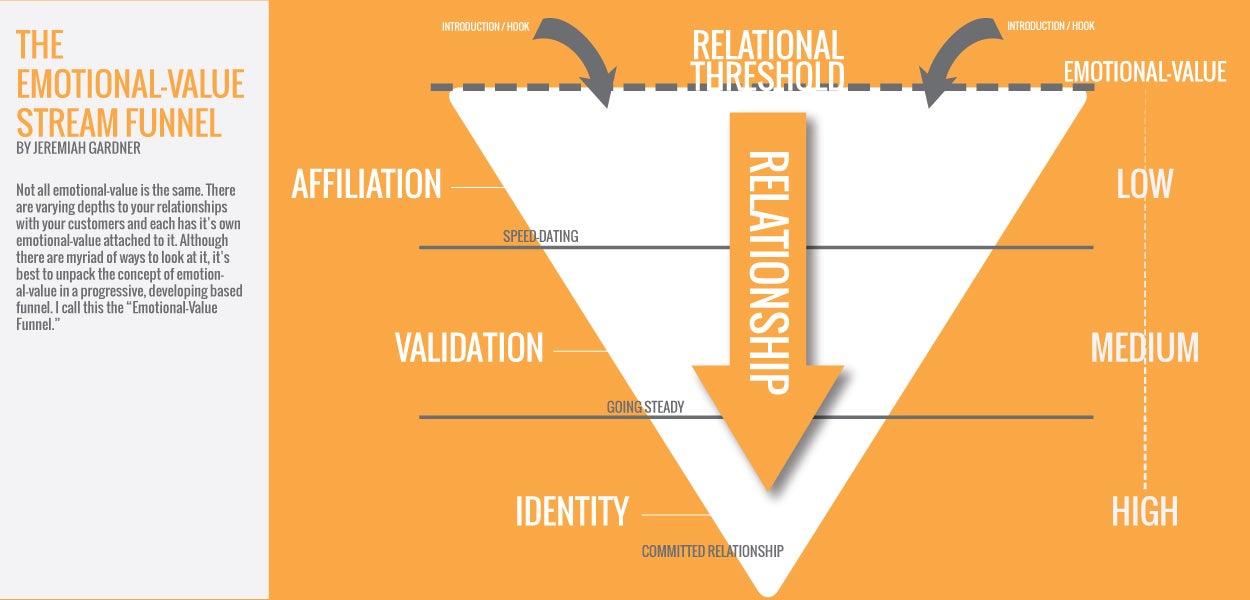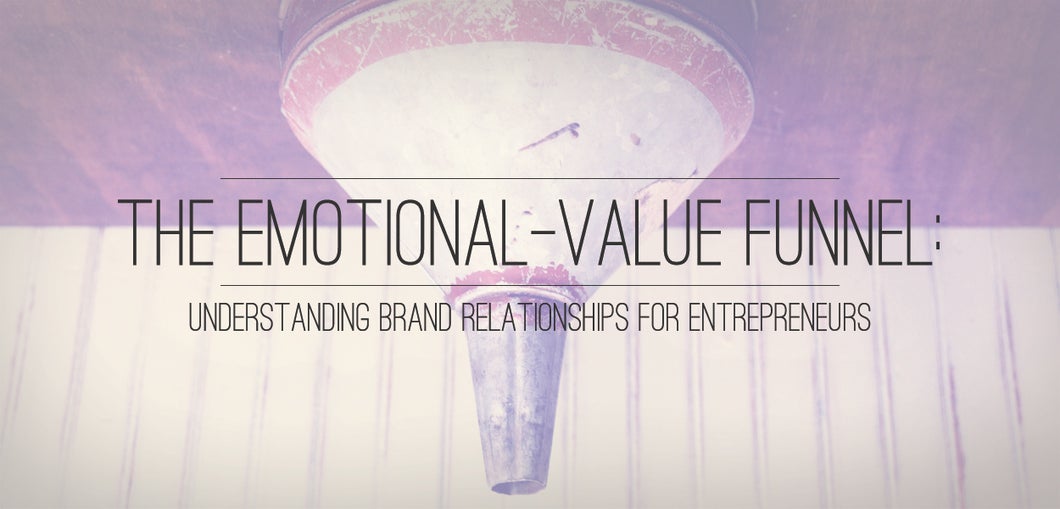Discovering your emotional-value is a fundamental ingredient to building a successful business. Your Brand, by very definition, is the pathway to discovering and building real emotional-value.
Why? Because brands define the relationship between you and your customers. People create allegiances and loyalty to brands because they form sets of emotional expectations and preferences about brands. Brands don’t and can’t compete at a commodity level…although often they act like they do. Instead, brands compete for emotional-value.
Not all emotional-value is the same. There are varying depths to your relationships with your customers and each has it’s own emotional-value attached to it. Although there are myriad of ways to look at it, it’s best to unpack the concept of emotional-value in a progressive, developing based funnel. I call this the “Emotional-Value Funnel.”
The Emotional-Value Funnel: Affiliation, Validation, Identity.
The emotional-value funnel looks like this:
Affiliation → Validation → Identity.

Affiliation
Affiliation is the starting point of any relationship. It simply says, “I like that” or, “I connect with that.” Affiliation is typically the result of good messaging. The message connects with us and we feel affiliation for what it has to say. The majority of advertising agencies and firms traffic in creating affiliation.
We have affiliations with a multitude of brands. There are tons of products and brands that I “like” but have never purchased from nor probably ever will. Affiliation is a non-exclusive, open-minded relationship that allows us to “flirt” with a brand and what they stand for without committing to a real relationship. That’s why I often refer to my colleagues in the advertising business as speed-dating professionals.
Too many entrepreneurs stop at affiliation. They are thrilled that someone likes their product or is “flirting” with it. Don’t ever mistake affiliation for value – advertising alone does not a relationship make.
Validation
Validation is the next depth of relationship. It says, “I need that,” or, “I demand that.” Validation is typically the result of great positioning. People feel validated when comparing one brand against another. Validation is a testament or affirmation of a person’s positioning against someone else. Good branding gets validation right.
If affiliation is speed-dating, validation is (as the old-timers say) “going steady.” It takes a lot for a brand to create validation. In the lean startup movement, validation is often called the product-market fit. It means that you are the right company, for the right person, at the right time.
Although validation is valuable, it is deceivingly temporary. Validation proves that you have created functional-value, but functional-value only retains it’s worth as long as something else doesn’t solve the problem better. If your relationship stagnates at the validation level, all it takes is another company to come along with the right product at the right time to lure your customers away from you.
Validation feels good, but it should never be the endgame of your relationship with your customers. Validation alone cannot sustain your value in the long run.
Identity
Identity is the deepest depth of relationship. It says, “I am that,” or, “I am the same as that.” Identity is the magical blend of messaging, positioning, authenticity and trust. When a person identifies him or herself with a brand, the line between brand and customer becomes dynamically blurred.
Identity is that fascinating place where terms like “Mac-Guy,” “Coke-lover,” and “Gucci-Girl” enter the story. People define themselves everyday with the brands they choose to buy, wear, use and promote. It’s where brands almost become a sort of religious experience and people turn into brand evangelists and spokespeople. It’s all in, full-blown, no holds barred emotional-value. If affiliation is speed-dating and validation is “going steady,” identity is a committed marriage. As the popular diamond saying goes, “Identity is forever.”
When the line between brand and customer becomes magically blurred, our emotional-value becomes irreplaceable. Every brand should compete for identity. It is the most potent relationship you can have in the emotional-value stream.
Discover Your Emotional-Value
In each portion of the funnel, the relational bond between company and customer strengthens.As emotional preferences and expectations get clearer, so does the relationship. As the relationship gets clearer, so does your emotional-value.
Looking at emotional-value in terms of a funnel works to clarify and strengthen your recognition of how people relate to you and what that means for your brand’s development. To build real emotional-value, it’s important to hypothesize, experiment, and validate the relationships you have with your audience.
As you experiment and develop your brand, single out transitional spaces where your relationships begin to move further down the funnel. Identify places where your relationships are stagnating and iterate to create fluent transitions. It’s not about an ivory tower understanding, but, instead, it’s about the blue-collar work it takes to move people through your emotional-value funnel.
Emotional-value is something that you have to plan for, work at and constantly experiment with. As entrepreneurs, getting your brand to identity isn’t where you’ll start, but with intentionality and authenticity, it’s an asset you can eventually attain.

